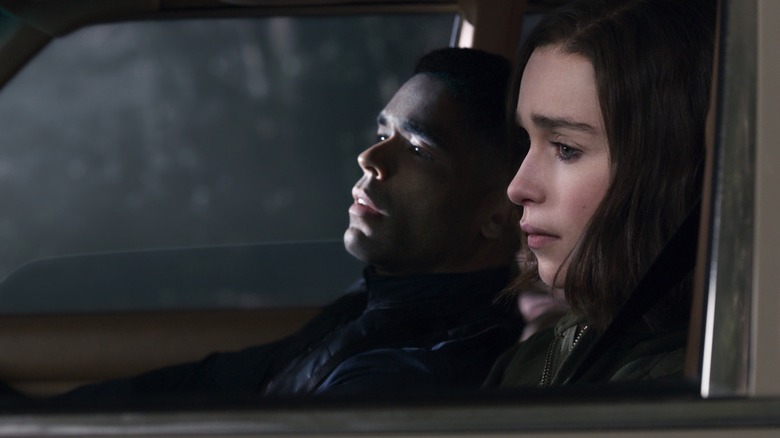Did Secret Invasion Lean On The Most Tired Comic Book Trope, Again?
The following article contains spoilers for "Secret Invasion" episode 3.
Marvel's latest Disney+ series "Secret Invasion" has Nick Fury (Samuel L. Jackson) and Talos (Ben Mendelsohn) trying to combat a group of Skrulls who are trying to start a war between America and Russia so they can take Earth as their new homeland. In the latest episode, G'iah (Emilia Clarke), who has been working with Skrull leader Gravik (Kingsley Ben-Adir), passes information about an attack to her father, Talos, so he can stop it. Unfortunately, Gravik knows that she's a mole.
That led to a big plot point that might not be a big plot point at all ... shapeshifting is very confusing. Not only that, but it appears that the show is using a very tired trope for the second time in three episodes. There are extenuating circumstances that may keep this event from fitting into this trope, but either way, it's very frustrating to watch. It's called "fridging," and whether or not it sticks this time around remains to be seen.
What is fridging and how did it work in Secret Invasion?
"Fridging" or "Women in Refrigerators" is a trope in comics (and pop culture in general now) that was first coined online by comic book writer Gail Simone. She was speaking about the trope where a woman who is important to the male character is killed (or something else terrible) to spur him on to some sort of action. (The term comes from "Green Lantern" Vol. 3 #54, where the hero comes home to find his girlfriend killed and stuffed into a refrigerator by his enemy.) G'iah being shot and seemingly killed by Gravik (complete with her turning back into her Skrull form) certainly does seem to fit here.
The earlier death of Maria Hill (Cobie Smulders) did as well. Hill did not turn into a Skrull, so she's gone for good unless she was a Life-Model Decoy (LMD), outside of a multiverse version of her, of course. What did her death accomplish? Not much, it seems, other than annoying fans and giving Fury a kick in the pants to find out how to stop all of this. G'iah dying could serve to do the same for both Fury and Talos.
I do want to say that a loved one's death can and often does change the trajectory of someone's life. It could certainly make them focus on revenge, change alliances, or move forward in a way no one expected. It's not that the trope is wrong as a concept or idea. It's just that it's so overused when we're talking about getting a male character to do something rather than vice versa. Often the female character isn't fleshed out at all and is just there as a plot-moving device. That's when it's an issue.
Are they really dead? Is anyone?
To be fair, character information isn't missing from G'iah and Maria Hill. Hill wasn't around much and certainly could have been developed more, but she wasn't in the Marvel Cinematic Universe just to have her death motivate Fury. G'iah has been explored a bit. I guess these were earned deaths. They just don't feel like it.
Of course, neither of them might be dead at all, which might take away the argument altogether. We saw Maria Hill die, but she could come back as an LMD, or the version that was killed might have been an LMD. G'iah turned into her Skrull form, but she might have already had some of the Super Skrull DNA that Gravik has used. (We saw him use Extremis to heal from Fury's knife wound.) Perhaps she's done that as well? The other issue is that we've seen the trailers for the show, and many scenes with G'iah are there that we haven't seen in the first three episodes. Is that the real G'iah who survived the shooting? It probably wasn't another Skrull because it appears that Gravik looks at her Skrull form. Do they make LMDs for Skrulls in S.A.B.E.R.? Will another Skrull pretend to be G'iah to mess with Gravik?
The issue here for me is the intent. Sure, they may not actually be dead, but their "deaths" were still apparently used to move the male characters to action. (At least Maria Hill's so far.) Again, it's not that the death of a loved one can't be used where it makes narrative sense. It's just that we've seen this trope enough that it immediately turns a lot of viewers off. I'll reserve judgment until the final episode, though.
"Secret Invasion" is streaming on Disney+.


